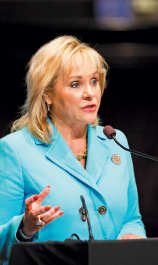What have been the most significant improvements to the Oklahoma business climate under your administration?
Gov. Fallin: Since taking office, my number one priority has been creating jobs and giving Oklahomans more opportunities. We’ve worked hard to implement policies that create a business-friendly environment, like cutting taxes, reducing unnecessary regulations, and overhauling the state’s workers’ compensation system. By moving from a costly, adversarial court-based system to an administrative model, we’ve created a 14 percent savings to businesses in just one year.
All of these policies have combined to get Oklahoma out of the recession and back on track. Since 2011, we’ve seen the creation of over 113,500 new jobs. In 2013 we had the fourth-fastest growing GDP in the nation.
What are your top three economic development priorities for the state in 2015?
Gov. Fallin: Increasing educational attainment: We know that for individuals to succeed in today’s workforce they need an education beyond high school — either a college degree or a certificate from one of Oklahoma’s great career technology centers. We also need to be able to provide Oklahoma’s businesses with a skilled, educated workforce if they are going to succeed and grow. To help develop that workforce I’ve pushed a degree-completion initiative called Complete College America, which aims to increase college degrees and career certificates awarded in Oklahoma by 67 percent in the next 10 years. I’ve also launched an initiative called Oklahoma Works, designed to help recalibrate our educational institutions to provide a pipeline of talented workers to our labor pool.
Helping Oklahomans earn more: Our economic development policies are aimed not only at creating jobs, but increasing personal wealth. During my first term, we saw personal income grow by 7.4 percent, the fifth-fastest growing per capita income level in the nation. I will continue to promote policies that will further this growth.
Improving our health: Getting healthier as a state saves lives, increases the standard of living and saves money for both families and businesses. Thousands of Oklahoma businesses have voluntarily participated in the Certified Healthy Businesses program to offer healthy life choices to their employees, and I’ve been proud to work with Oklahoma City Thunder star Kevin Durant to launch the Governor’s Get Fit Challenge to help combat childhood obesity.
Oklahoma is positioned to become a global leader in the unmanned aerial systems industry. What assets in particular give your state a leg up on the competition in this field?
Gov. Fallin: In 2011, Oklahoma State University began offering the nation’s first graduate degrees in unmanned aerial systems (UAS) and last year, Oklahoma was one of the founding members of the International Consortium of Aeronautical Test Sites (ICATS), further establishing our role as a leader in this field. And we’re not slowing down. We have more than 200 square miles of UAS airspace — from surface to 40,000 feet. If you turn the pages of this issue, you’ll find more and more reasons why Oklahoma is the fly-to state for UAS research, development, testing, evaluation and manufacturing.
Oklahoma has long been recognized as a leader in the agrobiology sector. What does the state need to do in order to ensure it retains its competitive edge in this industry?
Gov. Fallin: Like any industry, the agrobiology sector is constantly changing and evolving. To stay competitive, we need to make sure we are leading the way in terms of research and innovation. Oklahoma is home to many public institutes that are pioneering research. These institutes represent nearly 20,000 jobs and received more than $3.45 billion in private investments in 2012.
We must also ensure that we are keeping a pipeline of talent ready to support the continued growth of this industry. During the 2013 academic year, Oklahoma’s public colleges awarded a record number of degrees and certificates in the STEM disciplines, an increase of nearly 30 percent in the last five years. Oklahoma will continue to place a significant focus on increasing the number of STEM graduates in our state to support our agrobiology companies and organizations.
As you meet with business leaders from around the country, do you find that there are still some common misperceptions about Oklahoma? If so, how do you counter them?
Gov. Fallin: I always try to encourage people to visit our state to see it for themselves, but that isn’t always possible. In those cases, I encourage people to read business news. Companies are consistently relocating to or expanding in Oklahoma, and there’s a reason for that: great quality of life, great people, low costs. While I am proud to be the spokesperson for our state, having CEOs explain why they chose Oklahoma for their business is pretty effective.
What’s the one thing about Oklahoma you wish every reader of this guide knew?

Gov. Fallin: Oklahoma truly is the land of opportunity. If you want to work for a world-renowned corporation, you can do that here. If you want to live in a bustling urban center, you can do that here. If you have always dreamed of starting a company, you can start one here. And you can do it in a state that’s as friendly to businesses as it is to people. Oklahoma wants you and your business here, and we will work with you to make sure you succeed. We aren’t out to tax you endlessly or pile on more and more regulations. We know that when Oklahoma businesses succeed, so do Oklahomans, and we want to make that happen.
What would you like your legacy in Oklahoma to be following your tenure as governor?
Gov. Fallin: Everything I do in my administration is to improve the lives of Oklahomans and create more opportunities for them. We made tremendous strides during my first term, but there is still work to do. By continuing to advance pro-business policies, we will further strengthen Oklahoma’s economy and make sure our state is the best possible place to live, work, and raise a family.

